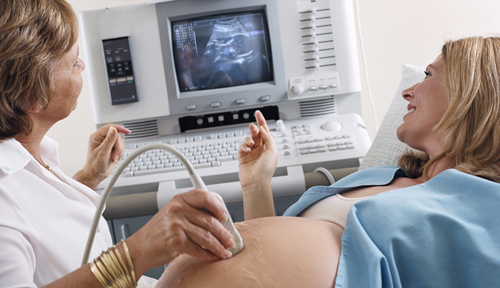You are 7 Weeks and 3 Days 228 days to go…
Even if you’re happy about having a baby, it’s natural to have mixed emotions at times.
Your baby today
At this stage, the embryo’s “tail,” shown curving up on the left, is starting to disappear. The somites of this area of the musculoskeletal system will eventually form the four fused bones of your baby’s coccyx—the lowest part of the spine.
Your emotions may fluctuate—one minute you’re laughing and the next you’re irritable and yelling, or crying. You might be confused that at a time when you should be happy, you often feel tense and tearful. Be reassured that this is a normal and temporary part of pregnancy.
Don’t be too hard on yourself since these changing moods are caused mainly by pregnancy hormones, which is something out of your control. They are the same hormones that cause the symptoms of PMS—rapid mood swings, crying, and irritability—that you might have experienced before.
Be kind to yourself during these down times and do what works best for you, whether it’s taking time out to be alone or sharing your feelings with others.
When you’re having a down day, remember that these negative feelings will pass; mood swings are a normal part of pregnancy.

… Safety
Protect yourself
Toxoplasmosis is a disorder caused by a parasite that can harm a developing fetus. The symptoms may resemble those of mononucleosis with a fever and/or swollen glands in the neck.
It can be spread through cat feces. However, it can also be spread from undercooked meat. Thus, in addition to avoiding changing cat litter, use some caution in the kitchen. Beef, pork, and lamb need to be cooked well. Avoid cross-contamination in the kitchen when preparing foods. Be certain to clean chopping boards and utensils well with hot soapy water after preparing meat.
Up to 70 percent of pregnant women sometimes have symptoms of depression.
While one woman hardly has any mood swings, another could suffer for weeks, especially in the first trimester.
… Doctor
| Q: | I’m struggling to deal with my wife’s mood swings. Are these normal? |
| A: | Yes, your partner will be emotional and all you can do is be as supportive, patient, and understanding as you can. At this early stage of pregnancy, her changing hormone levels may cause mood swings and unexpected emotional responses. Sometimes things that have never been a problem, such as hearing a particular piece of music, might make her cry, or she may snap at you over something trivial. With her emotions out of kilter, she’s likely to be as frustrated and confused by this behavior as you are. Until it passes, just bide your time, bite your tongue, and give her a hug. |
Prenatal Care Options
Throughout your pregnancy, you may be cared for by a family-practice doctor, obstetrician, or a combination of the two. The goal of your prenatal care is to monitor you and your baby so that problems can be identified and managed.
Your care during pregnancy
Early in pregnancy, you will need to think about who you would like to care for you during pregnancy, labor, and the postpartum period. You will also need to consider where you want to give birth since this will have an influence on your choice of care provider. The main options are set out below, although these may vary depending on where you live. When you attend your first prenatal appointment at 8–12 weeks , you will be given information about the prenatal services you can access in your area. The medical checkups that are done during this appointment will also help establish the best choice for your prenatal care.
Types of prenatal care
The majority of your care will usually be provided by an ob/gyn. At your first appointment, she will outline the prenatal services you will receive.
Group medical practice
With this type of care, you will see two or more doctors (typically ob/gyns and/or family practitioners) throughout your pregnancy on a rotating basis. One of these doctors will be present at the hospital when you deliver.
Solo medical practice
You’ll only have one doctor, and you will see her at every prenatal visit. She will attend your birth at the hospital, unless she’s unavailable and arranges for another doctor who covers for her to be present for your delivery.
Combination practice
With this type of care, you’ll get to see both doctors and midwives. At least one ob/gyn and one nurse-midwife sees patients on a rotating basis. Depending on the practice, a midwife may or may not be able to assist in delivery at the hospital. Expect a doctor to be present.
Maternity center-based practice
If your pregnancy is low-risk, you can see certified nurse-midwives for most of your appointments throughout pregnancy. Ob/gyns are available for consultations as required. If you choose this option, you’ll deliver your baby at the maternity or birthing center that is associated with the practice, unless complications arise, in which case your care would be transferred to the affiliated hospital.
Independent certified nurse-midwife practice
Some states permit midwives to practice without a doctor in the office. If this type of care is available in your area and you have a low-risk pregnancy, you can see midwives for all of your appointments, and a midwife would be present at your delivery in a hospital, birthing center, or at home. The midwives generally have arrangements with doctors, who are available for consultations as needed.
Where you give birth
This important decision doesn’t have to be made at your initial appointment, but your midwife or doctor may discuss the options at this time. It’s wise to be aware of the risks, benefits, and consequences of your choice. If you have a preexisting problem, or one that develops during pregnancy, this must be factored into your decision on where you will give birth.
In the hospital
Some women prefer to give birth in a hospital with doctors and medical equipment close by. Also, some women need specialized care and input from obstetricians because of existing conditions or problems that develop in labor. In this case, the obstetrician and the midwife will work closely together. Other specialists may also need to be involved during labor, for example if a woman has diabetes or a heart condition.
In a birthing center
These units provide a homelike setting. They are led by midwives with no obstetric input and have facilities such as birthing tubs and pools. The goal at a birthing center is to make labor and birth more natural, with less monitoring and fewer routine medical procedures and interventions. Some pain medication may be available, but epidurals are not. Some birthing centers are next to or affiliated with hospitals so that, if necessary, you can be transferred quickly. Birthing centers are an option that is recommended for low-risk pregnancies.
At home
A home birth is an option for women who want to give birth in familiar surroundings. However, a home birth is only advised for women who have low-risk pregnancies and for those with no preexisting medical problems. In the US, home births are considered controversial because complications can develop during the labor or the delivery, even in women with low-risk pregnancies. The American College of Obstetricians and Gynecologists and the American Medical Association oppose home births because of the potential for complications.
Hospitals have clinics where you may go for routine scans.

Midwives provide care at doctors’ offices, maternity centers, or their own practices.

Your options
Informed choice
Being able to choose the type of care you receive is one of the most important aspects of pregnancy and childbirth. Make sure that you have the most up-to-date, evidence-based information available so that you can make informed decisions. The care you receive should take into account any special needs you have, such as a disability, or cultural or religious beliefs. You should be able to discuss the options with your doctor and feel free to ask her whatever you want, change your mind, and know that your preferences, regardless of the recommendations made by the doctor, will be supported.
Your care providers
Several different health-care professionals will care for you during pregnancy and labor, and in the postpartum period:
Ob/gyns provide the vast majority of care for women in pregnancy, labor, and the postpartum period. They’re specially trained to handle all phases of pregnancy and postpartum recovery. If you have a preexisting condition that could complicate your pregnancy, like diabetes or high blood pressure, or if you’re pregnant with twins, you should see an ob/gyn. Special doctors known as high-risk obstetricians, or maternal-fetal medicine specialists, may see you for some appointments if you have a very high-risk pregnancy, such as a baby diagnosed with a serious medical condition or a history of pregnancy complications or repeated loss.
General practitioners (GPs) may alternate appointments with ob/gyns.
Midwives can provide care for women with low-risk pregnancies throughout all phases of pregnancy and the postpartum period. Certified-nurse midwives often work in a practice with ob/gyns but sometimes can practice on their own. They are registered nurses with extra education and training who are certified by the American College of Nurse-Midwives.
Pediatricians are doctors with special training in the health of babies and children. All babies born in a hospital have a newborn checkup by a pediatrician before being discharged.
Neonatologists specialize in the care of newborns with problems.